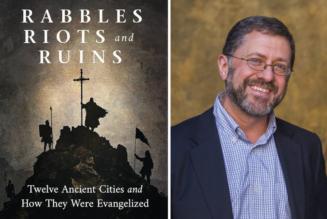By Dr. Jeff Mirus ( bio – articles – email ) | Jan 15, 2021
It is hard to know how to handle a rant. As a general rule, I am convinced that it is better to use bad news as a motive to deepen our commitment to Christ, grow spiritually, and engage more fully in Catholic mission. That’s true even if mission depends increasingly on prayer as our public opportunities for success become more and more constricted.
But this emphasis can sometimes prove abrasive to the faithful Catholics we most want to encourage. It is one thing to point out the flaws of those who have given themselves over to the values of the dominant culture; it is quite another to explore the flaws of those who are largely on the side of Christ. But sometimes using bad news as a motive to deepen our commitment involves exploring aspects of our habitual responses that are not as fully Christian as we think they are. Why pick on the “good guys”?
One reason is because those of us who are, let us say, “anti-secular” in the Church today are also subject to various temptations which undermine our ability to respond in holiness to the challenges of our time. Apart from whatever personal and even private temptations and vices we try to conceal, there are broader or more typical “reactionary” cultural temptations which afflict otherwise highly-committed Catholics today. This is hardly surprising for two reasons: First, we all yearn deeply for a sense of community and common cause, and we often find that this deep sense of community is lacking in our parishes and dioceses. Second, the devil always tempts serious Christians by exaggerating their legitimate human desires and even their wholesome spiritual sensibilities to the point at which they become outright errors and sins. Count on it.
Whether it is a more or less perpetual self-justified angry grouchiness, the substitution of “conservatism” for Catholic social analysis, or the substitution of “traditionalism” for a genuine appreciation of past Catholic cultural forms, we find that there are three broad confusions which tend to creep into the lives of the beleaguered serious Catholic minority throughout the secularized West. Perhaps more than any analysis I could possibly provide here, a simple reflection on the nature and condition of Catholic social and ecclesiastical life in the first few centuries, as compared with what we know of Catholic joy and mission in the same period, ought to make us ashamed of the servile manner in which we cling to dubious tempers, associations and principles to relieve the pain we feel at being marginalized.
How very weak we are! But perpetual grouchiness is by its very nature joyless and closed (non-missionary); and “conservatism” as it exists in the larger world is not the same thing as Catholicism, or even, in its political aspects, as a love of Catholic social teaching; and “traditionalism is not the same as Catholicism, or even, in its historical aspects, as a love of Catholic traditions. Rather, we must recognize that, while secularism is the great pitfall of those who are already prone to give up a real relationship with God, so are there great dangers to those who are attempting to stay the course of Christ: First, bitterness, which is a retreat into an isolated and mission-less self-righteousness; second, a partisan conservatism which not infrequently exchanges important elements of Catholic truth and virtue for a sense of national pride, camaraderie and political relevance; and, third, traditionalism, which so often eschews humility, obedience and aesthetic suffering in order to harvest the personal satisfaction found in outward forms.
Thus are we tempted to attune our Faith to what are essentially worldly and even diabolical “channels”. It just seems like we could make a lot more headway in terms of holiness and Catholic mission if we, as Catholics, did not latch onto what are, in Christ’s eyes, essentially irrelevant categories—or worse.
So having said all this, here are the five things I regret about 2020, as a year of lost Christian opportunity:
- The Divinization of Donald Trump: Four years in, way too many Catholics (who, being sincerely Catholic, felt obliged to vote for the most pro-life candidate they could find) were still defending Trump’s colossal disrespect for others, titanic hubris, and frequent stupidity as the marks of what one emailer insisted to me was the “All American Dad”. If only Donald Trump had taken Belloc’s poem to heart, which says that “the grace of God is in courtesy”, he would still be President a week from now. [For another year, we have depended on politics instead of on Christ.]
- Confusion of Political Conservatism with Catholicism: In a similar vein, we have managed to get through another year without a serious effort to develop an authentic Catholic politics which draws more from a careful reading of Catholic social teaching than from that combination of nationalism and individualism which has for so long prevented the full range of Catholic values from finding any home within the American political landscape. [For another year, we have lacked the courage of our uniquely Catholic convictions to at least point toward a real transformation of our socio-political life.]
- Conflicting Camps and Claims surrounding Pope Francis and Pope Emeritus Benedict: And once again, the furor over whether Pope Francis or Pope Benedict is right, and even over whether Pope Francis or Pope Benedict currently occupies the Chair of Peter, has muddied the Catholic waters of salvation. As Cardinal Müller stated recently, the false narrative of a division between the Pope and the Pope Emeritus is “harmful”. It won’t do to pretend that Pope Emeritus Benedict wants to be a rallying point for opposition to Pope Francis, as if we can persuade Benedict to admit that his deliberate resignation was invalid, or that he wants to continue to guide the Church from behind the curtain, or that the only proper way to judge Francis is by the closeness of his alignment to Benedict. [For another year, too many of us have failed to “get over it” and let God be God.]
- Confusion between Francis the Man and Francis the Vicar of Christ: Popes can be, and fairly often have been, weak, confused, or preoccupied with their own essentially worldly agendas. Even when they have been better than that, this has not guaranteed their prudence in choosing what to emphasize and how best to emphasize it. I will admit that it is a shame that we have, in the present pontificate, a man who seems to believe that as much correspondence with the world as is possible, within the broadest limits of the Catholic Faith, is the way to foster peace and win souls. But it remains possible to recognize the weaknesses of Pope Francis as a man for whom we pray while still honoring him as our ecclesiastical father. [For another year, we have failed to recognize the limitations of our own judgments about the Church; we could have held our own opinions more gently, preferring to use prayer and sacrifice for the heavy lifting.]
- Occasions of complaint instead of occasions of grace: To sum up, nearly all of us have spent more time in 2020 than strictly necessary chasing down rabbit holes and complaining about being stuck. The value of this to Catholic mission is approximately non-existent. [For another year, we have failed to make all we could of the occasions of grace which God has ordained for us.]
Believe me, I include myself. And I hope I join all my readers in being very happy to have the opportunity to try again.
Sound Off! CatholicCulture.org supporters weigh in.
All comments are moderated. To lighten our editing burden, only current donors are allowed to Sound Off. If you are a current donor, log in to see the comment form; otherwise please support our work, and Sound Off!

There are no comments yet for this item.
Join Our Telegram Group : Salvation & Prosperity











